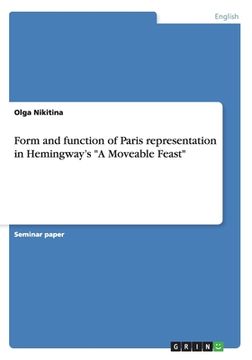Compartir
form and function of paris representation in hemingway's "a moveable feast" (en Inglés)
Olga Nikitina
(Autor)
·
Grin Verlag
· Tapa Blanda
form and function of paris representation in hemingway's "a moveable feast" (en Inglés) - Nikitina, Olga
$ 44.83
$ 89.66
Ahorras: $ 44.83
Elige la lista en la que quieres agregar tu producto o crea una nueva lista
✓ Producto agregado correctamente a la lista de deseos.
Ir a Mis Listas
Origen: Estados Unidos
(Costos de importación incluídos en el precio)
Se enviará desde nuestra bodega entre el
Lunes 22 de Julio y el
Miércoles 31 de Julio.
Lo recibirás en cualquier lugar de Ecuador entre 1 y 3 días hábiles luego del envío.
Reseña del libro "form and function of paris representation in hemingway's "a moveable feast" (en Inglés)"
Seminar paper from the year 2007 in the subject American Studies - Literature, grade: 1,3, University of Bonn, language: English, abstract: A Moveable Feast deals with the years 1921 to 1926 spent by Hemingway as a young man at the beginning of his literary carrier in Paris. He started to write it in 1958 and it actually remained unfinished when he committed suicide in 1961. Taking into account the fact that at that time Hemingway had already written all his best books, that in 1953 he was awarded The Pulitzer Prize and in 1954 - the Nobel Prize for Literature, one could suppose that the book was written by a successful and confident author who looked back at his young years with a gentle smile (sort of "how it all started") probably not without nostalgia. But if one takes a closer look at Hemingway's biography one finds out that the Paris book was being written by the "the rapidly ageing Ernest" [Svoboda, p.159] in the midst of health problems and family pressure, probably foreseeing the end of his literary career, suffering from continuous depressions and paranoia. Add to all this repercussions of the two plane crashes which he survived and the loss of the mother, Pauline Hemingway and his close friend and editor Charles Scribner and you will be able to imagine (probably quite remotely) what Hemingway's state of mind really was while he was writing the book in question. What could be the message of the book written under such circumstances - at the top of the literary career and facing the gap of despair? Was it an attempt to explain to himself what he had done wrong with his life, to calculate what had been lost and what had been gained during Paris years or to prove that in spite of increasing difficulties with writing he is still a great writer? Was he trying to show what had made him the kind of writer he was and (as he desperately hoped) still kept him on the top or was he simply recollecting the old happy times in order to forget the present frustration? A
- 0% (0)
- 0% (0)
- 0% (0)
- 0% (0)
- 0% (0)
Todos los libros de nuestro catálogo son Originales.
El libro está escrito en Inglés.
La encuadernación de esta edición es Tapa Blanda.
✓ Producto agregado correctamente al carro, Ir a Pagar.

